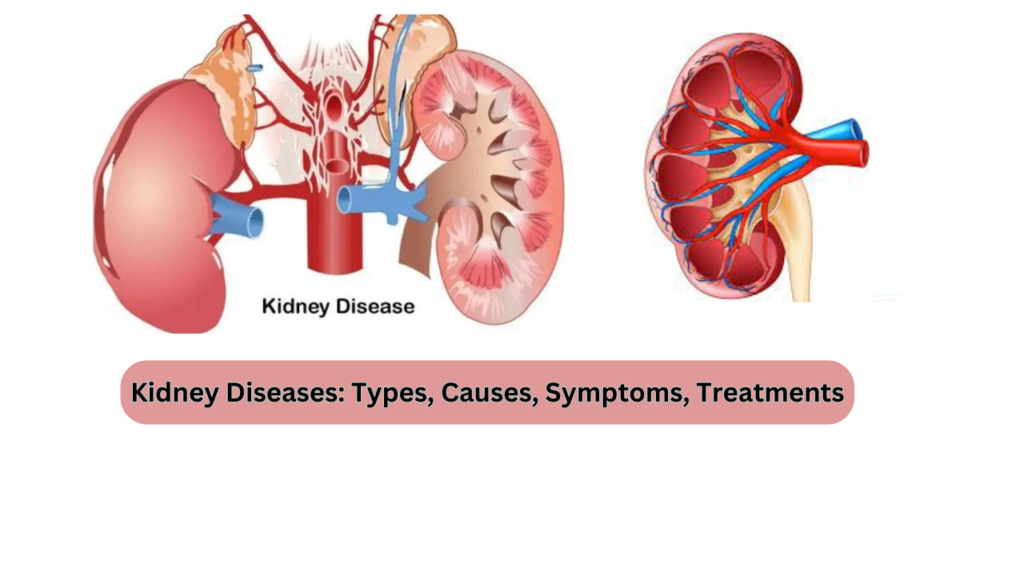For proper functioning of our body, it must contain just the right amount of water. Here, our kidneys play an important role. It removes excess water from our body. It also removes waste products from the body, balances the body’s fluids and releases hormones that regulate blood pressure. Knowing the essential role played by this crucial body organ, any disease in the kidney can be harmful for our health. So, let us know more about kidney diseases.
Types of Kidney Diseases
- Chronic kidney disease (CKD)
When your kidneys can’t filter toxins or extra fluid from your blood as well as they should, Chronic kidney disease (CKD) develops. Even though CKD can vary how serious it is, usually it gets worse over time.
- Polycystic kidney disease: This is a genetic disorder which causes cysts (fluid-filled sacs) to grow on your kidneys, limiting their ability to filter waste from your blood.
- Lupus nephritis: An autoimmune disease, Lupus, means your immune system attacks healthy cells. Lupus nephritis develops when your immune system attacks your kidneys.
- Interstitial nephritis: When you have a bad reaction to a medicine that limits your kidneys’ ability to filter toxins, the condition of Interstitial nephritis happens. Your kidney health can improve, if you stop the medicine.
- Glomerulonephritis (glomerular disease): Glomeruli plays a crucial role in our body. These are the thousands of tiny filters that remove waste from your blood in your kidneys. The condition of Glomerulonephritis damages them, and your kidneys can’t function as well.
- APOL1- mediated kidney disease: Generally, the APOL1 gene helps make an immune system protein. However, if you inherit a mutated version of the gene from both parents, you may be more at risk for kidney disease. If you identify as Black, African American, Afro-Caribbean, or Latina/Latino, you may be more likely to have this gene mutation.
- Long-lasting viral illnesses: Hepatitis B, hepatitis C, HIV and AIDS may cause kidney disease.
- Pyelonephritis: A urinary tract infection, Pyelonephritis, can result in scarring as the infection heals. If it happens several times, it can lead to kidney damage.
Causes of Kidney Diseases
- Acute Kidney disease causes: Suddenly, if your kidneys stop working, doctors call it acute kidney injury or acute renal failure. It happens because of inadequate blood flow to the kidneys, direct damage to the kidneys, or urine backed up in the kidneys.
- Autoimmune diseases: If your immune system attacks your body, it can also cause an acute kidney injury.
Causes of Chronic Kidney Diseases: If your kidneys don’t work well for longer than 3 months, doctors call it chronic kidney disease. In the early stages, you may not have any symptoms, but that’s when it’s simpler to treat.
High blood pressure and type 1 and 2 diabetes are the most common culprits. Over time, high blood sugar levels can harm your kidneys. It creates wear and tear on your blood vessels, including those that go to your kidneys.
Use of Drugs And Toxins- Long term use of some medications like NSAIDs (nonsteroidal anti-inflammatory drugs) like ibuprofen and naproxen, and IV street drugs can permanently damage your kidneys.
Drinking Alcohol: Your kidneys have to work harder to perform their function, if you drink. The chances of developing chronic kidney disease can increase, if you are drinking alcohol on a regular basis.
Symptoms of Kidney Diseases
As our kidneys are very adaptable, they can compensate for some of the problems that can happen when you have kidney disease. Hence, if your kidney damage gets worse, slowly your symptoms will reveal themselves over time.
Signs of Kidney Diseases Can Be:
- High blood pressure
- Vomiting and nausea
- Loss of appetite
- Fatigue
- Weakness
- Difficulty in thinking
- Sleep problems
- Muscle cramps
- Swelling in feet and ankles
- Pain in chest if fluid builds up around the lining of the heart
- Shortness of breath if fluid builds up in the lungs.
Treatment of Kidney Diseases
Definitely, some types of kidney disease are treatable. Some treatments can ease symptoms, help keep the disease from getting worse, and lessen complications. Even though your treatment may help restore some of your kidney function, there is no cure for chronic kidney disease. In this case, you and your doctor will manage it together.
First, your doctor will work to find out the causes of kidney diseases. For example, kidney disease can happen if you have diabetes or high blood pressure. You can work with a nephrologist, a doctor who specializes in kidney disease.
You will have to take medicines and may need to make changes in your diet. Just in case, if your kidneys don’t work anymore, you might need dialysis, where a machine filters your blood, and you can discuss with your doctor about whether a kidney transplant would help.
Medications for Kidney Disease
If you have high blood pressure, it can make chronic kidney disease more likely– and kidney disease can affect your blood pressure. Hence, your doctor can prescribe some types of blood-pressure medicines:
ACE inhibitors, such as:
- Captopril (Capoten)
- Enalapril (Vasotec)
- Fosinopril (Monopril)
- Lisinopril (Prinivil, Zestril)
- Ramipril (Altace)
ARBs, such as:
- Azilsartan (Edarbi)
- Eprosartan (Teveten)
- Irbesartan (Avapro)
- Losartan (Cozaar)
- Olmesartan (Benicar)
- Valsartan (Diovan)
These medicines, along with controlling blood pressure, can lower the amount of protein in your urine. This can help your kidneys over time.
Dapagliflozin (Farxiga) and empagliflozin (Jardiance), the diabetes medicines, have been shown to slow kidney disease even in people without diabetes.
You may also need to take a medicine to help your body make erythropoietin. This is a chemical that tells your body to make red blood cells. Hence, you may get a prescription for daprodustat (Jesduvroq), darbepoetin alfa (Aranesp), or epoetin alfa (Procrit, Epogen) to curb anaemia.
Diet for kidney disease
A special diet that’s lower in protein, sodium, potassium, and phosphate can help you in your kidney diseases. You can also have limits on how much water can be in the foods you eat and how much you drink.
If you have high blood pressure or diabetes, you’ll need to follow your doctor’s diet advice. In case of diabetes, it’s important to make the right food choices so that your blood sugar levels stay under control throughout the day. And for high blood pressure, you may need to have a low-salt diet to help manage it.
Dialysis
You will need dialysis, if your kidneys don’t work well anymore. To cleanse your blood, hemodialysis uses a machine with a mechanical filter. At the dialysis center or your home, you can get this done.
Kidney transplant
Kidney transplant can be a treatment option, if your kidney disease is advanced. You can get a “matching” kidney from a living family member, from someone who’s alive and isn’t a relative, or from an organ donor who has recently died. This can be a major surgery and if it gets successful, you don’t have to get dialysis. You will need to take medicines after your kidney transplant, so that your body accepts the donated kidney.
FAQs
Can consuming alcohol affect the kidneys?
Yes. The regular consumption of alcohol can increase the chances of developing chronic kidney diseases.
Why are the kidneys crucial body organs?
Kidneys remove excess water from our body. It also removes waste products from, balances the body’s fluids and releases hormones that regulate blood pressure. Due to these reasons, kidneys are crucial body organs.
Is Diet helpful for kidney diseases?
Yes. A special diet that’s lower in protein, sodium, potassium, and phosphate can help you in your kidney diseases.
visit Home Page



2 Comments
Informative
Thanks for support .